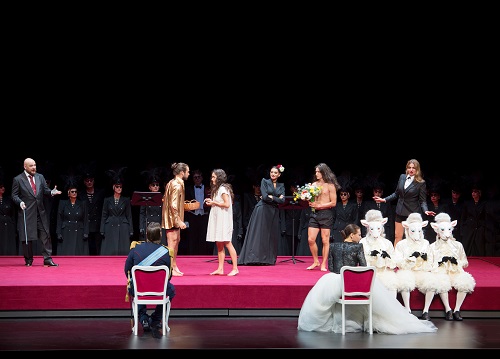
 Germany Salzburg Festival [5] – Tchaikovsky, The Queen of Spades: Soloists, Salzburg Festival and Theatre Children’s Choir (chorus master: Wolfgang Götz), Concert Association of the Vienna State Opera (chorus master: Ernst Raffelsberfer), Angelika Prokopp Summer Academy (stage music), Vienna Philharmonic Orchestra / Mariss Jansons (conductor). Grosses Festspielhaus, Salzburg, 25.8.2018. (MB)
Germany Salzburg Festival [5] – Tchaikovsky, The Queen of Spades: Soloists, Salzburg Festival and Theatre Children’s Choir (chorus master: Wolfgang Götz), Concert Association of the Vienna State Opera (chorus master: Ernst Raffelsberfer), Angelika Prokopp Summer Academy (stage music), Vienna Philharmonic Orchestra / Mariss Jansons (conductor). Grosses Festspielhaus, Salzburg, 25.8.2018. (MB)

Cast:
Hermann – Brandon Jovanovich
Count Tomsky, Plutus – Vladislav Sulimsky
Prince Yeletsky – Igor Golovatenko
The Countess – Hanna Schwarz
Lisa – Evgenia Muraveva
Pauline, Daphnis – Oksana Volkova
Chekalinsky – Alexander Kravets
Surin – Stanislav Trofimov
Chaplitsky – Pavel Petrov
Narumov – Gleb Peryazev
Governess – Margarita Nekrasova
Master of Ceremonies – Oleg Zalytskiy
Masha – Vasilisa Berzhanskaya
Chloë, Prilepa – Yulia Suleimanova
Sheep – Imola Kacso, Márton Gláser, Joan Aguila Cuevas
Production:
Hans Neuenfels (director)
Christian Schmidt (set designs)
Reinhard von der Thannen (costumes)
Stefan Bolliger (lighting)
Nicolas Humbert, Martin Otter (video)
Teresa Rotemberg (choreography)
Yvonne Gebauer (dramaturgy)
The Queen of Spades is a curious work. I do not mean that in a negative sense; there is nothing intrinsically wrong with curiosity and often much right with it. How we consider the opera will doubtless – and rightly – remain a matter of debate. There is rarely ‘one way’: how boring it would be, if there were. Or, as Schoenberg once put it, only the middle road does not lead to Rome. What, however, seems to me crucial is to remember what one would have thought a very obvious point, namely that this is an opera. It is not a musical ‘version’, or ‘translation’, or anything else, of Pushkin. Of course it has roots in Pushkin’s story, just as Elektra does in Sophocles; it is, however, a free-standing piece of work, in which music plays the most important role of all.
In his New Grove article on the opera, Richard Taruskin writes, in characteristically combative style: ‘For these deeds the Tchaikovsky brothers have been castigated many times over by guardians of literature, second-guessed by a Soviet production team under Meyerhold (their attempted “repushkinization” of the opera was shown at the Leningrad Malïy Theatre in 1935), and rebuked by puritanical but unimaginative critics who cannot hear the music to which the cannily adulterated libretto gave rise. What critics have been slow to recognize is precisely what the composer meant when he wrote with such uncharacteristic confidence about his originality: Tchaikovsky’s penultimate opera is the first and possibly the greatest masterpiece of musical surrealism.’ My only real cavil lies with the ‘but’; whoever heard of an imaginative puritan? Otherwise, although one may or may not agree with every word, therein lies the basis of an understanding.
Hans Neuenfels differs from Taruskin in a number of ways. He is also doing something different: mounting a production, not writing an essay or encyclopædia article. He is quite clear, though, as we learn both from an interview in the programme booklet and, more important, from the staging itself, that the ‘great achievement’ of Tchaikovsky’s brother, Modest, ‘was to turn the material into an opera libretto. This means that he augmented the story, adapting the narrative in a way that gives rise to a musical setting.’ A contrast between public and private is not particular to this opera, nor is a concentration on development by – or even juxtaposition of – scenes; one might say that Eugene Onegin does the same, more successfully and/or conventionally, according to taste. But a sense of listening to the music, of drawing us in to listen to it too, is strongly apparent both in the designs, from longstanding Neuenfels collaborators, Christian Schmidt and Reinhard von der Thannen, and in the action they frame, interpret, even incite.
Place is crucial. The Countess’s room is surprisingly spare, brilliant in its whiteness, most likely not at all as one had expected. Why? It is certainly elegant, part of a visual style to which we might have become accustomed through stagings such as Neuenfels’s celebrated Bayreuth Lohengrin. There is surely an element of kinship there; after all, there is an experimental basis to the action of both works, both productions: failed, tragic experiments in both cases, although that failure seems questioned by Neuenfels too. Perhaps there is something in that, but I think the point is more specific. As Neuenfels explains, ‘This is connected with the climax of the opera, when it reaches a point of maximum clarity. It’s the clearest scene and at the same time it’s blank. Although it appears to be the vaguest scene, it’s the most realistic one. It also has the palpable consequences. Things will be decided there.’ So it seemed – and, equally important, so it sounded.
It would be difficult, perhaps even in the wrong sense absurd(ist), to rid oneself entirely of Fate here. It is surely, however, a good thing to interrogate or at least to examine, rather than meekly to accept so amorphous and, frankly, unhelpful a concept. When the Countess’s face reappears on huge video screen above the action in the final scene, when she winks – knowingly, of course, but to what end? Is her ‘role’ meaningful or a red herring? – we are free, within limits, to make what we want of it. Hermann’s decision, perhaps even society’s decision, has been made. That is as much a beginning as a close. Her lust for the young stranger in her room was clear; maybe he actually gave her there what he wanted. We continue to think – as she continues to appear. Is she, however, noticed any more? Was she ever? Hermann’s dismissal of Lisa, cruel, heart-rending (from her standpoint) is very much in that line. We need not commend it; it would be odd to do so, although there is perhaps something almost of Crime and Punishment to the ‘act’. There is no denying, however, his purpose, born out of an extreme loneliness, alienation, and disaffection. The blackness of much of the space on stage, within which stark, sharp costumed action takes place renders that visually clear: a visual clarity born within libretto, music, and performance. When Lisa, clad in white, finally crosses the threshold to join her silhouette, it is both her tragedy and Hermann’s dismissal of her. This scarlet Nutcracker-prince will once again enact his own tragedy.
The other side to that, at least an other side to that, is in the Imperial Russia of the story. Mixing periods, stitching them together is too often a recipe for an ‘anything goes’ post-modernism unworthy of the name: nowhere more so than in middle-of-the-road, would-be fashionable opera stagings. Here, however, the stylised – nothing is real? everything is surreal/hyper-real…? – evocations of a late-nineteenth century looking back to the eighteenth (Mozart and Catherine the Great) and forward to our own time prove tight and yet also allusive and elusive enough for the question never to arise. Details stick, point one in the right direction, without detracting from the wide open space, musical as much as scenic, of the broader ‘picture’. Take the unforgettable image, during the Mozartian pastiche of a pastoral wedding entertainment, of sheep flunkeys knitting their own wool: societal cannibalism of a degenerate aristocracy, or rather, more tellingly still, of its immediate underlings. It is, after all, neither Yeletsky nor Tomsky who ‘loses’; it is Hermann. Or is it? Time, the one thing he does not have here, will tell. Or the arrival of Catherine the Great: a brittle, black madonna: manipulated or manipulative? Why choose? Her crowd of followers, bowing and scraping, is also her crowd of creators. Just as it has been of the river: men and women in boaters and swimwear transformed into the Neva itself. Scenery, like Fate, is constructed in dialectical materialism. So too is the ‘drama’ itself.
Or is it? In one sense, presuming one assents to those broadly Marxist terms, yes, of course. It would be meaningless to claim that it were not, even if it were ‘mere’ ideology. That applies to the music as much as the libretto, the performance as much as the staging. Yet, for all but the most vulgar of Marxists – and surely even for them – there is relative autonomy too. There is grit to the oyster. This is, we remember, an opera; it is neither Pushkin nor a treatise. The blazing, yet far from soft-edged Romanticism – a problematic word, I know, yet let us leave that on one side for now – we heard from Mariss Jansons and the Vienna Philharmonic added its own level of complexity, or perhaps better, laid the foundation for most of that which came on top. Public and private, Fate and autonomy, cynicism and love: these and so much else found their roots in the bubbling cauldron of Tchaikovsky’s score in its own mediated nineteenth-to-twenty-first-century presentation and reinvention. Dynamic and tempo contrasts took us further to the edge than anything merely seen – and rightly so. This is, we remembered once again, an opera.
Which brings us, last yet anything but least, to the singers, above all to the towering performance of Brandon Jovanovich as Hermann. His clarity and strength of purpose, portraying yet never fatally (as opposed to fatefully!) partaking in doubt, offered an object lesson in tortured heroism and anti-heroism. One both believed in him and did not, rooted for him and did not: everything, it seemed, that the Tchaikovskys asked of him. Evgenia Muraveva’s Lisa, sweetly, intelligently sung, with collegiate agency such as to mark her out yet not to overpower, was equally well-judged: no easy thing in such circumstances. Hanna Schwarz truly captured the essence, an essence at least, of the Countess, nowhere more so than in the hushed, nostalgic intimacy, finely balanced between ‘she still has it’ and ‘soon she might not’ of the Grétry air, ‘Je crains de lui parler la nuit’. Igor Golovatenko and Vladislav Sulimsky made the most of their role as Yeletsky and Tomsky respectively: again contributing to, furthering the drama, vocally excelling, without a hint of grandstanding. The same might be said of the rest of a tightly-knit cast and of the chorus, from whom more often than not one might have taken dictation. They had clearly been well prepared by Ernst Raffelsberger, well directed by Neuenfels and his team, but granted agency too, individually and en masse. Is that not what opera in general and this opera in particular should be? It is certainly, I think, what we in the audience too should be aiming for too. In that, as in much else, work, performances, and production should be accounted a great success.
Mark Berry
Once again a “review” comprising seven! paragraphs trying to explain the production, and one! paragraph regarding the singers,mostly about their acting and almost nothing of their vocal quality…..why?
Ken Rowland
Did you see the production? What then would you have written? All these things are subjective of course but there is plenty about the ‘quality’ of the cast and certainly not ‘almost nothing’.